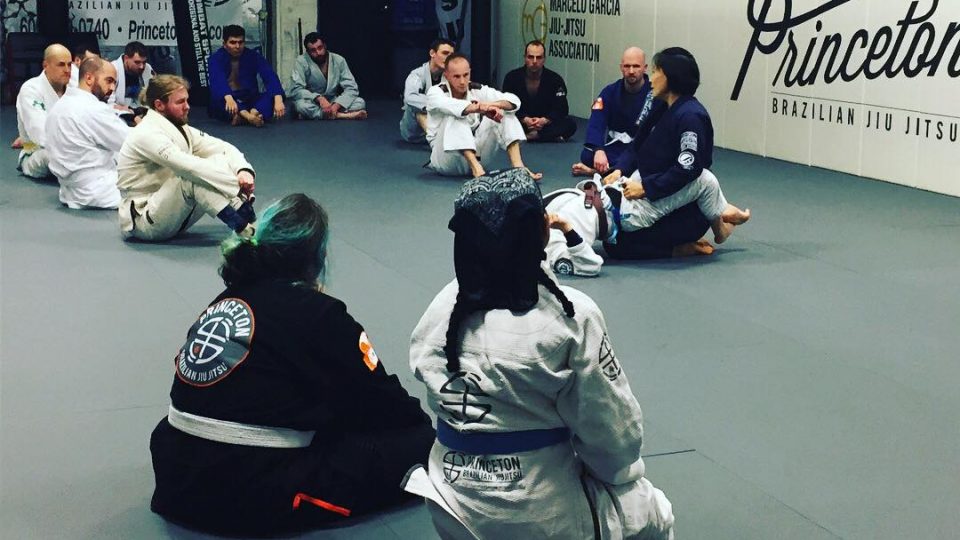12 Rules For White Belt Life
12 RULES FOR WHITE BELT LIFE
An Antidote For BJJ Chaos
By: Joe Hannan
Most grapplers with some experience likely have their own set of rules for survival as a white belt. These are mine, codified on the receiving end of the shoulder of justice and other less-than-desirable positions. May they serve you well.

1. Admit You Know Nothing. Anyone looking to take up BJJ should perform the following exercise for an entire day: Whenever anybody asks you anything, say you don’t know. It could be your name, the color of the sky, or what year it is. You say, “I don’t know.” Get comfortable with admitting your own ignorance. Embrace it. It makes the first few miles on the road of your BJJ journey a bit smoother.
2. Ask Questions. Now that you’re comfortable with your BJJ ignorance, start building your baseline knowledge by asking intelligent questions. More often than not, when an instructor asks if there are any questions, they’re met with stony silence. They know you have questions. Ask them. Questioning is a surefire way to keep yourself intellectually engaged. That means you’ll learn faster.
3. Write Down the Lessons. Get in the habit of keeping a BJJ notebook. As soon as you get home, chuck that gi in the washer, hit the shower, then open it up. Write down as much of the lesson as you can remember. Before your next lesson, crack it open and review the previous lesson.
4. Don’t Be Smelly. Even though you know nothing, you can’t conveniently forget about hygiene. A smelly gi is not only unpleasant for anyone you train with, but it’s also a ticking biological time bomb ready to spread a virulent antibiotic-resistant infection to you or your training partners. So be kind and wash that sucker as soon as you get home. For more BJJ Hygiene tips, check out this post.
5. Accept That You’ll Suck for a While. Emily put it best in this recent post. BJJ can be supremely discouraging because it’s so unlike any other sport most of us have played. Hell, it’s even unlike most martial arts. Be patient with it. From my experience, as soon as you stop trying to force it, that’s when it starts to make sense.
6. Fail Fast. Now that you’ve made peace with your suckage, get in the habit of failing gloriously, spectacularly, maybe even elegantly. Inoculating yourself to the sting of failure only means that you’re going to get better faster.
7. Be On Time. Some instructors are OK with you arriving a little late. Others, not so much. But know this: Their time is valuable. They’ve spent years learning the skills that they’re trying to impart to you. Be respectful of their time and be ready for class when it starts. And don’t ever, ever skip the warm-ups. Which leads us to Rule Eight…
8. Prioritize Fitness. In the almost three years I’ve been training, I’ve watched a lot of white belts burn out simply because they couldn’t handle the taxing, physical nature of BJJ. Even if you have a good baseline level of fitness, Jiu Jitsu will wear on your body in ways that no other sport will. It’s true that the only way to get better at Jiu Jitsu is to train Jiu Jitsu. But in the long run, you’ll be able to train more and absorb more the fitter you are. Note well: Nutrition and sleep are also critical ingredients to BJJ fitness.

9. Go to Open Mat. Live training can be one of the most intimidating aspects of learning Jiu Jitsu. It’s also one of the most educational. This is where the rubber meets the road, in terms of putting technique into a practice. It’s also going to elevate your overall level of conditioning. Check with your instructor. If they think you’re ready for open mat, then go as often as possible.
10. Listen to your Body. There are going to be times when you’re pretty banged up, and you’re torn between training and resting. From my experience, ignoring the signals my body is sending has resulted in several somewhat serious injuries. Give your body the recovery time that it needs. BJJ is a lifelong pursuit. Missing a class to nurse an injury now and again won’t kill you. That being said …
11. Don’t Make Excuses. You may be hurting, or you may just not be in the mood to train. Only you know the difference. I’ve adopted the Jocko Willink mindset (outside of competition prep) that if I really don’t feel like training, I’ll make a bargain with myself that I will train anyway with the intention of giving myself the next training day off. I can only think of a single time when I regretted this approach, and it was because I didn’t listen to my body, which was trying to tell me that I was on the verge of throwing out my back. 99.9 percent of the time, I’ve trained anyway, felt better about myself for doing it, and trained the following scheduled training day.
12. Respect Your Training Partners. Match their level of intensity when rolling. Respect their skill level. For too long, I made the major mistake of thinking that a good roll was one in which you put everything you had into it, circumstances be damned. This isn’t mental toughness, it’s actually weakness. It blunts your ability to learn. Roll with intent.


